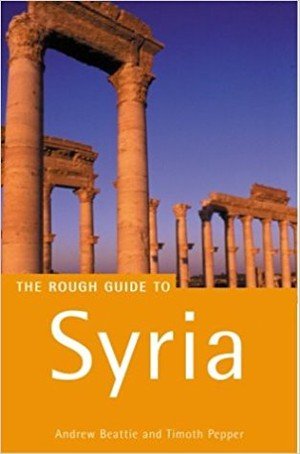Items related to The Rough Guide to Syria

Syria is one of the most enticing destinations for travellers in the Middle East. Formerly home to some of the world’s earliest civilizations (the cities of Damascus and Aleppo both claim to be the oldest sites of continuous settlement in the world), the country played a pivotal role in the early history of both Christianity and Islam, and boasts a rich past which encompasses the architectural and cultural influence of the Romans, the early Arabs, colonial France and imperial Turkey. That so much history and variety can be crammed into one small country is part of its appeal as a destination; still more so, though, is the character of the Syrian people themselves, who are unfailingly courteous and welcoming to foreign visitors.
Politically, modern Syria is a result of boundary drawing by the old colonial masters of the region, France and Britain. The French took over Syria in 1920, occupying the political vacuum left by the end of four hundred years of Ottoman rule after World War I, and separated their territory from British-administered Transjordan by drawing a ruler-straight line across the desert. During its 26-year rule France did little for the country, governing it without the consent of the people and treating it largely as a barracks. So it was with an understandable lack of confidence that Syria approached its hard-won independence: coup followed coup in the early 1950s, and then came the disastrous political union with Egypt, which broke up into a further period of political instability in the 1960s. From 1971 until 2000 the country was ruled by President Hafez al-Assad, the leader of the Syrian wing of the Ba’ath (Arab Socialist) party, and a former air-force commander and defence minister. Assad maintained power with unerring shrewdness, never letting his country lapse into the civil war and anarchy that beset neighbouring Lebanon for much of the 1970s and 1980s, and he left a legacy of political stability to his son Bashar, who succeeded him in June 2000 without any obvious show of popular discontent.
Despite its myriad attractions, Syria remains one of the least-visited, and least-familiar, countries in the world. Jammed in between the vastly more popular tourist destinations of Turkey, Jordan and Israel, for many years it has been considered an unlikely destination by many travellers, who have been scared off by a combination of perceived safety worries, the yards of red tape that a visit required, and Syria’s internal-security-obsessed military government. Through much of the 1980s these fears were justified: Syria was cast as a supporter of international terrorism and a number of Western countries broke off diplomatic relations with it, making it virtually impossible for many nationalities (including Britons and Americans) even to set foot there. But after President Assad voiced support for the Allies during the Gulf War and helped to secure the release of Western hostages in Beirut, things started looking up as far as travellers were concerned. A steadily growing stream of Westerners visited the country in the late 1990s, and the smooth accession to power of Bashar al-Assad, coupled with the new president’s determination to build on the positive changes in economic and diplomatic outlook of the country which his father had laid the foundation for during the last years of his rule, suggest that the country’s tourist fortunes can only develop further in the early years of the new century.
Most Syrians are Arabs, though there is some degree of diversity – in Aleppo, for example, you’ll find Armenians and Turks. The greatest concentration of non-Arabs, however, is in the northeast, where Kurdish is spoken by those who dare – using the language has long been seen as a sign of dissent, particularly in the light of the Kurdish uprising in neighbouring Turkey. Syrians are divided more on religious than ethnic grounds: although the majority are followers of Sunni Islam, there is a large Christian minority (itself divided into a number of sects), plus a tiny number of Jews. President Bashar al-Assad himself, like his father, is a follower of the Alawite religion, a curious offshoot of Islam followed in the mountains of the northwest, with the Druze and the Shiites making up the remaining minority groups.
Though Syria is a small country (about twice the size of Scotland, or half the size of California), its history of political isolation and continuing high rate of population growth reduce the amount and effectiveness of international aid, and the country is one of the poorest in the region, with huge internal disparities in the levels of prosperity. The rich, Europeanized urban elite of Aleppo and Damascus, most of whom have got where they are through government connections, live largely separate lives from the majority of the people. In the same cities, however, you’ll find the familiar trappings of developing-world poverty – shoe-shine boys out in force, begging, prostitution, and hawking of all kinds – while in the countryside agriculture is carried out using age-old techniques of irrigation, planting and harvesting with a proliferation of carts and working animals, and few modern machines. Many of the Bedouin, the traditional tent-dwelling nomads of the Middle East, have been forcibly resettled by the government in towns and cities, but some still roam the desert with their herds of goats and sheep, their lifestyle substantially unchanged for centuries.
"synopsis" may belong to another edition of this title.
"About this title" may belong to another edition of this title.
- PublisherRough Guides
- Publication date2001
- ISBN 10 1858287189
- ISBN 13 9781858287188
- BindingPaperback
- Edition number2
- Number of pages368
- Rating
Buy New
Learn more about this copy
Shipping:
FREE
Within U.S.A.
Top Search Results from the AbeBooks Marketplace
The Rough Guide to Syria
Book Description Paperback. Condition: New. Seller Inventory # Abebooks511866
THE ROUGH GUIDE TO SYRIA
Book Description Condition: New. New. In shrink wrap. Looks like an interesting title! 0.79. Seller Inventory # Q-1858287189

